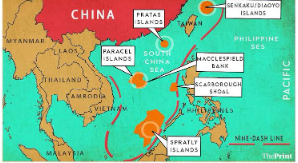Context:
Amid overlapping sovereign claims in the South China Sea, the article details China’s aggression in the South China sea and how the region has been militarily equipping itself against China.
South China Sea Dispute:
- The South China Sea dispute involves island and maritime claims of several sovereign states of the region who contest China’s claim over such territory.
- Parties to the dispute: This includes Brunei, Taiwan, Malaysia, Indonesia, Philippines, and Vietnam that are directly involved in the South China Sea dispute with China.
China’s Stand:
- While these countries question China’s claim of its sovereignty over the region, China does not recognize them and claims the islands and maritime lanes are within the nine-dash line and are a part of its own territory.
- China is opposed to the internationalisation of the South China Sea disputes and demand that such conflict should be resolved bilaterally without the intervention or mediation from any other nation or multilateral institutions.
Importance of South China Sea:
- The South China Sea (SCS) is important not just to its littoral countries. It has been a transit point for trade since early mediaeval times, contains abundantly rich fisheries, and is a repository of mineral deposits and hydrocarbon reserves.

Image Source: The Print
Nine-Dash Line:
- Beijing stakes claim to most of the region and at the heart of this claim is the U-shaped ‘nine-dash line’ that includes as much as 90 per cent of these waters.
- This dotted line was adopted from Chinese maps in the 1940s, and represents Beijing’s claim over the sea and all the land features that are contained within the line.
- It stretches hundreds of kilometres south and east of China’s southerly Hainan Island, covering the strategic Paracel and Spratly island chains.
- According to China, the dash lines mean the ocean, islands and reefs all belong to China and that China has sovereign rights.
- But it’s discontinuous, meaning that other countries can pass through the lines freely.
Attempts to Resolve Dispute:
- The Philippines invoked the dispute settlement mechanism of the UN Convention on the Law of the Sea (UNCLOS) in 2013 to test the legality of China’s ‘nine dash line’ regarding the disputed Spratlys.
- In response, the Permanent Court of Arbitration (PCA) at The Hague decreed in its 2016 judgement that the line had “no legal basis.”
- China dismissed the judgement as “null and void.”
Growing Chinese muscularity in the SCS:
- Patrolling: Enhanced patrolling and livefire exercising by Chinese naval vessels;
- Infrastructure Development: Building of runways, bunkers, and habitation for possible long term stationing of personnel on the atolls claimed by China.
- Exploration: Chinese exploration and drilling vessels compete aggressively with those of other littoral countries in the disputed waters.
Growing chorus of protest against China:
- Having Vietnam, Japan and the U.S. riled up about its actions is nothing new for China.
- The Philippines and the ASEAN beginning to protest is new, even if their criticism is restrained.
- Indonesia protested to China about Chinese vessels trespassing into its waters close to the Nantua islands, towards the south of the SCS.
- The Philippines protested to China earlier this year about violations of Filipino sovereignty in the West Philippine Sea.
Options for India considering its interests in the region:
- The SCS carries merchandise to and from India. It follows that India has a stake in the SCS, just as China has in the Indian Ocean.
- India must continue to actively pursue its defence diplomacy outreach in the Indo Pacific region:
-
- increase military training and conduct exercises and exchanges at a higher level of complexity,
- extend Humanitarian Assistance and Disaster Relief activities,
- share patrolling of the Malacca Strait with the littoral countries, etc.
- The Comprehensive Strategic Partnerships that India has concluded with Australia, Japan, Indonesia, the U.S., and Vietnam could be extended to Malaysia, the Philippines, Thailand, and Singapore.
- India must also buttress the military capacity of the tri service Andaman and Nicobar Command.
News Source: The Hindu
![]() 21 Feb 2023
21 Feb 2023
